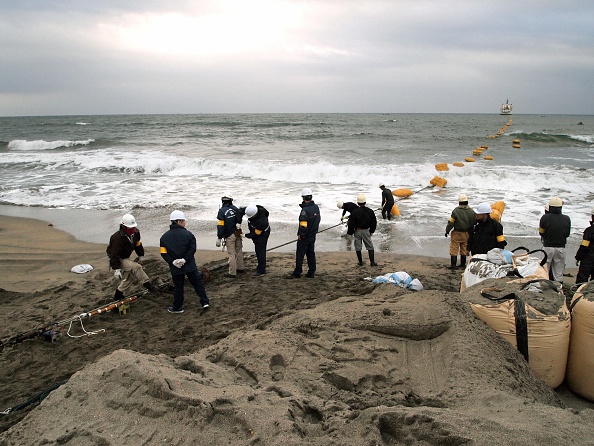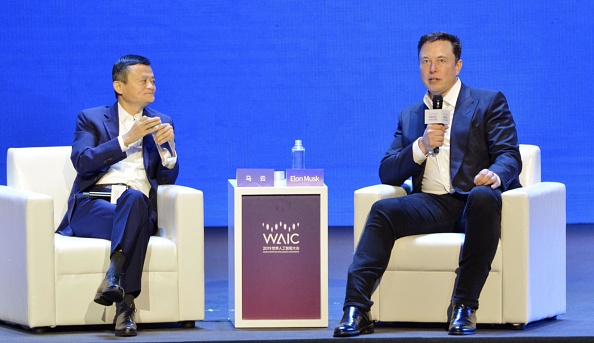
 "Sorry, it's the way I negotiate"
"Sorry, it's the way I negotiate"The US-China trade war finally cooled down this week, if just for a moment, after both sides showed restraint following last weekend's sharp escalation in tariffs. China confirmed Thursday that it wouldn't retaliate against President Trump's newest round of tariffs, worth $550 billion. "The most important thing is to create the necessary conditions for continuing negotiations," Commerce Ministry spokesman Gao Feng told reporters in Beijing. Both sides also affirmed their commitment to the high-level trade negotiations set for next month.
The change of tone gave Wall Street a much-needed boost after a tense and confusing Group of Seven meeting last week, which included Trump sidestepping a joint meeting on climate change and defending his style of negotiating. "Sorry, it's the way I negotiate," he said. "It's done very well for me over the years, and it's doing even better for the country."
Though chaotic, French President Emmanuel Macron celebrated the small victories of the summit, and even Trump praised the "great unity" between the G7 leaders. Still, there remains many issues dividing the leaders, and it's yet to be seen if the US-China trade war will rattle the unsteady global economy once again.
 Docked Plans
Docked PlansAlthough the US and China are signaling a willingness to work together on trade, tensions are still high elsewhere in the relationship. A Wall Street Journal report this week revealed Washington's plans to block an undersea cable backed by Google, Facebook, and a Chinese partner over national security concerns. The fiber-optic cable, which is almost completed, extends 8,000 miles between Hong Kong and Los Angeles and is intended to increase internet speed between Asia and the United States. According to reports from the Federal Communications Commission, the cable is to connect data centers in California, Hong Kong, Taiwan and the Philippines.
In the past, Washington has approved cables linking the US directly to mainland China, but with tensions and mistrust high, the Justice Department is likely to reject business licenses for the project. The move is in line with the Trump administration's overall approach towards Chinese technology, and Huawei in particular.
Supporters of the undersea cable, which so far has cost over $300 million, say that US involvement in the project will allow Washington to better regulate internet traffic at a time when concerns over cybersecurity and espionage are at a high. Daniel Ikenson, Director of the Cato Institute's Center for Trade Policy Studies, says that instead of blocking involvement with Chinese telecommunication technologies in general, "the governments should agree to a framework" on cyber malfeasance and data infrastructure.
 Human Intelligence
Human IntelligenceAmerican and Chinese tech titans Elon Musk and Jack Ma held a one-on-one discussion this week at the World Artificial Intelligence Conference in Shanghai, where they discussed the possibility of a 12-hour work week, population collapse, and the future of artificial intelligence. On the topic of humans vs. computers, the two billionaires disagreed on which was smarter, with Ma attesting that "I've never seen a computer invent a human being."
Elon Musk's appearance at the Chinese AI conference comes as the US and China are battling not only on tariffs and trade, but also over AI dominance. And as the founder of Tesla, which just opened a multi-million dollar factory in Shanghai, Elon Musk has stakes on both sides of the Pacific. Just last week, President Trump tweeted a call to action for all US companies to move their operations out of China, although he lacks any legal power to make that happen. With 11% of Tesla sales coming out of China, Tesla is unlikely to comply.
Jack Ma similarly is in a similarly awkward position as the founder of tech giant Alibaba. Last year Ma proposed to bring Alibaba to the US, potentially creating up to 1 million jobs in the states, but as the trade war intensified, Ma was forced to abandon the idea.
Though the two billionaire entrepreneurs steered clear of trade war-related topics, they had no problem debating the fate of human competency. "The biggest mistake I see people making is to assume they're smart," Musk told Ma. Artificial intelligence will be "much smarter than the smartest human you will ever know."
Prepared by China-US Focus editorial teams in Hong Kong and New York, this weekly newsletter offers you snap shots of latest trends and developments emerging from China every week, while adding a dose of historical perspective.
- 2019-08-23 Tit for Tat
- 2019-08-17 Slowdown Ahead?
- 2019-08-09 Yuan on the Rocks
- 2019-08-02 Ratcheting Up the Crisis
- 2019-07-26 Playing Defense
- 2019-07-19 “Stain of the Century”
- 2019-07-12 Whichever Way the Wind Blows
- 2019-07-04 A Gentlemen’s Agreement
- 2019-06-28 A Truce on the Horizon?
- 2019-06-22 Three’s A Crowd
- 2019-06-14 Battle for Hong Kong
- 2019-06-07 Panda Diplomacy
- 2019-05-31 Trade Diversions
- 2019-05-25 Farm Aid or Band Aid?
- 2019-05-17 Risky Business
- 2019-05-10 Two Steps Forward, Two Steps Back
- 2019-05-03 The Final Laps?
- 2019-04-26 The Great Turbine Caper?
- 2019-04-19 Sowing Seeds of Tension
- 2019-04-12 Slow or Steady?
